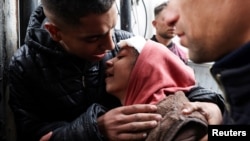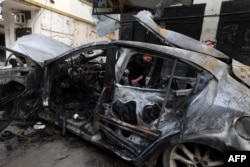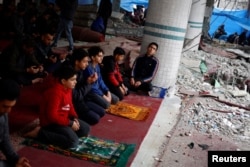The Hamas-run Gaza health ministry reported Friday more than 100 people were killed by Israeli airstrikes in the Gaza Strip over the last 24 hours.
Reports from Gaza indicate Israel conducted airstrikes in the southern cities of Khan Younis and Rafah, with at least 104 deaths reported by the health ministry. At least 29,514 Palestinians have been killed since the fighting began in October, according to the ministry.
At the same time, media outlets are reporting Israeli Prime Minister Benjamin Netanyahu unveiled his post-war plan for Gaza to his war cabinet late Thursday, calling for Israel to maintain long-term security with military and civilian control of the territory.
It calls for — in cooperation with Egypt and in coordination with the United States — Israel to control entry and exit to Egypt through the southern border. It is not clear if Egypt has approved the plan. The U.S. cable news network CNN quoted an Israeli official as saying Egypt was “aligned” with the Unites States regarding the plan.
Media reports indicated Palestinian representatives who have seen the plan have rejected it. Parts of the plan also run counter to what Washington has envisioned for the region, which is a “two-state” solution involving an independent Palestinian state.
Drone strike in West Bank
The Israeli military said Friday it carried out a drone strike in the occupied West Bank city of Jenin late Thursday, killing a suspected militant from the Islamic Jihad group.
A military statement said Yasser Hanoun was on his way to carry out a shooting attack. It gave no further details. Hanoun had been implicated in past shooting attacks by Islamic Jihad, the military said.
The West Bank has seen an increase in violence since the October 7 Hamas terror attack on Israel.
Cease-fire efforts
Israel says new attempts are underway to reach a cease-fire deal with Hamas to temporarily halt fighting in Gaza and to secure the release of more than 100 hostages still being held by the militants.
Those attempts include sending negotiators Friday to truce talks in Paris, Israeli media reported. The head of Israel’s Mossad intelligence service will lead the group.
Israeli Defense Minister Yoav Gallant told U.S. Mideast envoy Brett McGurk on Thursday that the government “will expand the authority given to our hostage negotiators.”
His comments came after Benny Gantz, who is on Israel’s war cabinet with Gallant and Netanyahu, said late Wednesday that new attempts are being made to reach a cease-fire deal. It was the first Israeli indication of new efforts since negotiations in Cairo among Israeli, U.S., Egyptian and Qatari officials stalled a week ago.
But Gallant said that release of the hostages was paramount and that unless Hamas agrees to free them, Israel will launch a ground offensive into Gaza’s southernmost town, Rafah, on the Egyptian border, during the Muslim holy month of Ramadan, which begins March 10.
Rafah has been the focus of international concern for the safety of Palestinian civilians.
At the G20 meeting where foreign ministers of the 20 leading rich and developing nations are gathering to discuss poverty in Rio de Janeiro on Thursday, U.S. Secretary of State Antony Blinken said involved parties should prioritize reaching an agreement to release the hostages.
“The Algeria resolution has not in itself resulted in a cease-fire,” Blinken said, referring to the weeklong cease-fire in November. “The best way to do that is to do exactly what we’re doing right now, which is to work intensely on an agreement on the hostages.”
Hamas captured about 240 hostages during its October 7 attack on Israel, while killing 1,200 people. About 100 hostages were released during the cease-fire in November. The Israeli military has said it believes about 30 of the remaining hostages have since died or been killed, leaving about 100 still held by Hamas.
Offensive moves in Gaza
While holding off on a full-scale ground attack on Rafah, Israel for days has launched airstrikes on the town, an area where nearly 1.5 million Palestinians have sought refuge. The Israeli military carried out airstrikes early Thursday.
The U.N. Relief and Works Agency for Palestine Refugees, UNRWA, said Wednesday that a rise in airstrikes in Rafah has “heightened fears that they will further hamper overstretched humanitarian operations” in the area.
Israel’s military said Thursday its forces conducted offensives in the Zeitoun area of Gaza City in the northern part of Gaza and in western Khan Younis in southern Gaza.
International reaction
In an opinion piece first published Wednesday in the Brazilian newspaper Folha, U.N. humanitarian chief Martin Griffiths urged officials at the G20 meeting in Rio de Janeiro to use their political leadership and influence to help end the war in Gaza.
“The atrocities befalling the people of Gaza — and the humanitarian tragedy they are enduring — are there for the world to see, documented by brave Palestinian journalists, too many of them have been killed while doing so,” he wrote. “No one can pretend not to know.”
At the G20 meeting, the foreign ministers were almost unanimous in their support for a two-state solution as the path to peace in the conflict, Brazilian foreign minister Mauro Vieira said.
“There was virtual unanimity in the two-state solution as the only solution to the conflict,” he said.
Blinken said he found “commonality” with G20 members on Gaza at the summit.
“There may be differences over tactics, and there may be differences over this Security Council resolution, but we’re trying to focus on actually getting results,” he said.
Some information for this report came from The Associated Press, Agence France-Presse and Reuters.









